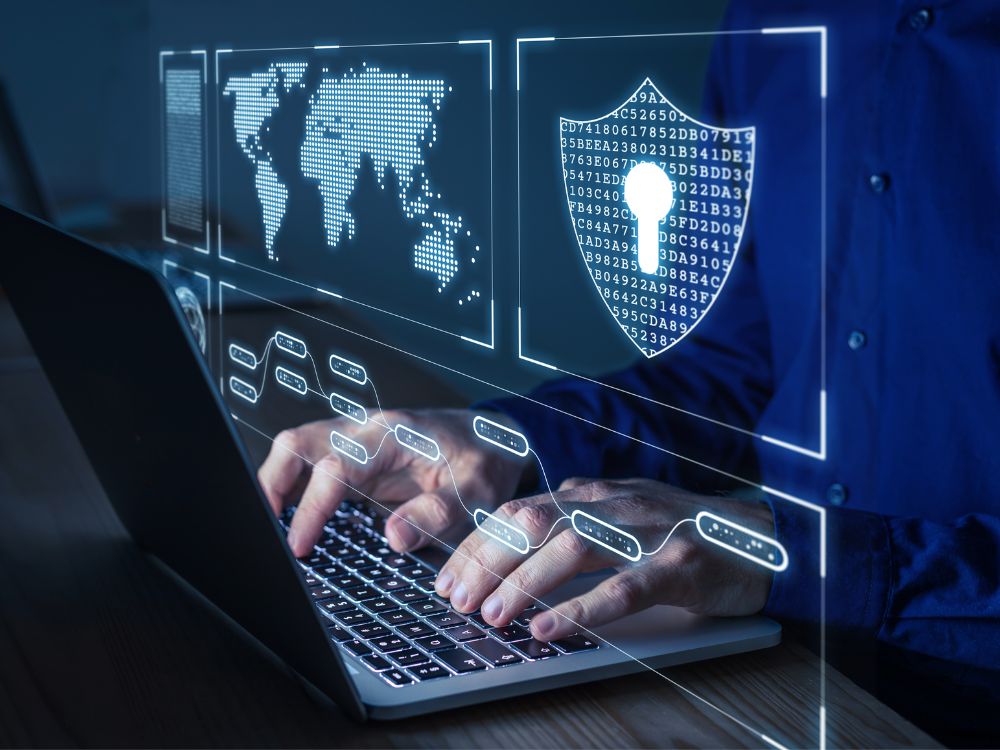NoneButDeals is a participant in the Amazon Services LLC Associates Program, an affiliate advertising program designed to provide a means for sites to earn advertising fees by advertising and linking to Amazon.com.
Cybersecurity is a vital aspect of modern society, as we have become increasingly dependent more and more on technology to accomplish our daily tasks and store sensitive data. The threat of cybercrime has permeated every sector, from businesses to government agencies and even individuals. The implementation of cybersecurity measures aims to safeguard sensitive information from being compromised by individuals engaged in cybercriminal activities.
Explanation of the Importance of Cyber Security in Today’s World
The importance of cybersecurity cannot be overstated in today’s world. Cybercrime is a growing concern as internet users continue to increase rapidly worldwide. According to a study by Risk-based Security in 2020, over 36 billion records were exposed in data breaches, which shows how critical it is for individuals and organizations alike to take cybersecurity seriously.
Cybersecurity breaches can lead to significant consequences such as financial losses, reputational damage, loss of intellectual property, or even physical harm. Especially for companies handle sensitive customer data, such as banking information, or social security numbers, a breach can have severe financial consequences due to legal penalties and regulatory fines that can cripple their operations.
Overview of the Role of Computers in CyberSecurity
In today’s digital age, computers are at the forefront when it comes to cybersecurity. They allow cybercriminals to access private information through various means, such as malware, phishing attacks, or hacking into networks.
However, computers also play a crucial role in defending against cyber threats through firewalls, antivirus software, and other security measures to prevent intrusions. In addition, computers are used for monitoring network activity and analyzing potential threats through various tools such as intrusion detection systems (IDS).
Overview
This post provides guidance on the best computers for cybersecurity students. Cybersecurity students require a computer that can handle various security-related tasks such as network analysis, penetration testing, and running virtual machines. Therefore, in this article we’ll provide an overview of the major factors to consider when searching for a computer for cybersecurity studies. It will also highlight some of the top options worth considering.
Consider the following essential aspects to consider when selecting a computer for students studying cybersecurity
Processor speed and power
When it comes to processing power, you want a computer that can run multiple programs simultaneously without slowing down. A CPU with high clock speed and multiple cores is essential for performing tasks such as running virtual machines, testing network configurations, and analyzing malware samples. For cyber security students, an Intel i5 or i7 processor or an AMD Ryzen 5 or 7 processor provides enough power for most tasks.
RAM and storage capacity
Regarding RAM (Random Access Memory), the rule of thumb is that the more, the better. Having adequate RAM ensures smooth operation when running multiple applications simultaneously. For example, more than 8GB of RAM is required for basic tasks like web browsing and word processing but may need more than just simple tasks such as malware analysis or virtualization.
Cybersecurity students typically need a minimum of 16GB of RAM. It’s important to consider the right hardrive storage you’lll need when choosing a computer.
Larger storage allows students to store large software tools used in cybersecurity, including virtual machines and forensic images. An SSD (Solid State Drive) is highly recommended over an HDD (Hard Disk Drive) because they are faster and more reliable.
Graphics card capabilities
While graphics card capabilities might not seem crucial for cybersecurity students’ computers, having a discrete GPU (Graphics Processing Unit) can be beneficial in some cases—for instance, when using visualization tools that require heavy graphical rendering.
Battery life and portability
Cybersecurity students often need to work remotely from various locations; therefore, battery life is particularly important when purchasing a laptop computer. Battery life should be able to sustain usage throughout the day between charges, if not more than that; otherwise, one might have issues during their working hours, resulting in poor productivity levels. Additionally, portability can also be a critical factor to consider when selecting a computer for cybersecurity students, especially for those who are on the go.
Operating system options
The choice of operating system depends on personal preference and the specific cybersecurity tools required. Windows is probably the most popular one you’ll find due to its compatibility with most security tools. Still, Linux is also helpful since it facilitates testing and experimentation with various tools and configurations.
MacOS laptops can be an excellent option for those who prefer Apple products or looking for a more secure operating system. Ultimately, it’s all depend on your needs.
Top Computer Options for Cyber Security Students
The Dell XPS 13
Features
- 13.4-inch FHD+ (1920 x 1200) touchscreen display: The display is sharp and clear, with wide viewing angles.
- Intel Core i7-1185G7 processor
- 16GB of LPDDR4x RAM: The RAM ensures that the system can handle multiple tasks at once without slowing down.
- 512GB SSD: The SSD provides fast boot times and app load times.
- Iris Xe Graphics: The integrated graphics card is capable of handling basic gaming and video editing tasks.
- Weight: 2.8 pounds
- Dimensions: 0.63 inches thick, 12.0 x 8.12 inches wide and long
- Battery life: Up to 12 hours
The Dell XPS 13 for cybersecurity students is a great choice. Its 10th generation Intel Core i7 processor offers a powerful and speedy performance.
Its 16GB RAM and 1TB solid-state drive also ensure enough room for all the necessary software tools and project files. Additionally, it boasts a beautiful and bright 13-inch display with an FHD resolution.
Pros:
- Pros include its excellent battery life, which can that juice up to 12 hours on average usage, making it perfect for long study or work sessions.
Cons:
- Its cons are that it lacks a dedicated graphics card, which may be important depending on the work students do.
- The price range varies from $1,249 to $1,979, depending on the specific model and specifications chosen.
The Lenovo ThinkPad X1 Carbon
Features
- 14-inch FHD (1920 x 1080) display: The display is sharp and clear, with wide viewing angles.
- Intel Core i7-8650U processor
- 16GB of RAM: The RAM ensures that the system can handle multiple tasks at once without slowing down.
- 512GB SSD: The SSD provides fast boot times and app load times.
- Intel UHD Graphics 620: The integrated graphics card is capable of handling basic gaming and video editing tasks.
- Black: The laptop has a sleek and stylish design.
- Weight: 2.9 pounds
- Dimensions: 0.63 inches thick, 12.0 x 8.27 inches wide and long
- Battery life: Up to 15 hours
Another great option is the Lenovo ThinkPad X1 Carbon with its powerful Intel Core i7 processor combined with up to 16GB RAM and a solid-state drive of up to 1TB in storage capacity. It also comes with an integrated Intel UHD Graphics card, which runs multiple programs at once while keeping the system stable. Its pros include excellent battery life (up to nine hours) as well as sturdy build quality making it durable over years of use.
The only con might be that while providing everything needed to learn about cyber security, this laptop may feel slightly overpowered compared to what some students might need. The price range varies from $1,122 to $2,186, depending on the chosen specifications.
The MacBook Pro 16-inch
Features
- 16-inch Liquid Retina XDR display for better resolution
- M1 Pro chip: The M1 Pro chip is a powerful and efficient chip that delivers up to 3.7x faster CPU performance and up to 13x faster graphics performance than the previous generation.
- 32GB RAM: The 32GB of RAM ensures that the system can handle multiple tasks at once without slowing down.
- 512GB SSD: The 512GB SSD provides fast boot times and app load times.
- FaceTime HD camera: The FaceTime HD camera offers high-quality video calls.
- Touch ID: Touch ID allows you to securely log in to your Mac and make purchases with Apple Pay.
- Space Gray: The Space Gray finish gives the MacBook Pro a sleek and stylish look.
- Weight: 4.7 pounds
- Dimensions: 0.66 inches thick, 14.2 x 9.7 inches wide and long
- Battery life: Up to 21 hours
The MacBook Pro 16-inch is a great option for cyber security students who prefer Apple’s operating system. It features an Intel Core i7 that can be upgraded to an i9, up to 16GB RAM and up to 1TB of storage.
However, it is crutial to note that the graphics card is an integrated AMD Radeon Pro 5300M, which may not be as powerful as some dedicated graphics cards.
Pros:
- Its pros include the excellent Retina display with True Tone technology, which makes it easier on the eyes during long study or work sessions.
It also comes with macOS, which has built-in security features and operates smoothly even when running multiple applications simultaneously. The price range varies from $2,399 to $3,899, depending on the chosen specifications.
The HP Spectre x360 14T
Features
- 13.5-inch 3:2 WUXGA (2256 x 1504) touchscreen display: The display has a high resolution and a 3:2 aspect ratio.
- Intel Core i7-1165G7 processor
- 16GB RAM: The 16GB of RAM ensures that the system can handle multiple tasks at once without slowing down.
- 512GB SSD: The 512GB SSD provides fast boot times and app load times.
- Bang & Olufsen Quad Speakers: The speakers provide high-quality audio.
- Fingerprint reader: Good for security.
- Weight: 2.8 pounds
- Dimensions: 0.63 inches thick, 12.0 x 8.12 inches wide and long
- Battery life: Up to 12 hours
The HP Spectre x360 14t offers a versatile design with a touch screen that can fold into different modes, such as tent mode or tablet mode, for ease of use. It has an incredible Intel Core i7 processor, and can hold up to 16GB of RAM. It has a solid-state drive of 2TB in storage capacity, making it perfect for those focused on projects requiring bulk data storage. Its pros include strong battery life (up to nine hours), excellent build quality, and stylish design.
Its only con might be that it doesn’t come equipped with any advanced-level graphics card. The price range varies from $1,149 to $2,299, depending on the chosen specifications.
Additional Considerations for Cyber Security Students
Security Features
Cyber security students should have at least one advanced device authentication feature like biometric authentication (such as fingerprint reader) or TPM (Trusted Platform Module). TPM is a secure microcontroller chip that is used to secure hardware through integrated cryptographic keys and passwords. Besides, full disk encryption, firewalls, and antivirus programs are other security features important for cyber security students.
Virtualization Capabilities
Running multiple operating systems simultaneously can be essential for cybersecurity students. One can do this by using virtualization software such as Oracle VirtualBox or VMware Workstation. Virtualization allows you to create a simulated environment where you can run different operating systems and applications without affecting your main system.
Recommended Software Tools
The most recommended software tools for cyber security students include Wireshark (for network protocol analysis), Metasploit (to test vulnerabilities), Nmap (network mapper), Kali Linux (an open-source penetration testing platform) and John the Ripper (a password cracker tool).
Conclusion
Regarding the perfect computer for cybersecurity students, several options are available depending on individual preferences and budget range. The Dell XPS 13, Lenovo ThinkPad X1 Carbon, MacBook Pro 16-inch, and HP Spectre x360 14t all offer excellent choices with their different specifications and features catered to the specific needs of individuals. Adding additional security features like biometric authentication or TPM modules along with virtualization capabilities ensures a safe environment for learning about cybersecurity, while recommended software tools provide the necessary resources for the practical application of knowledge.









